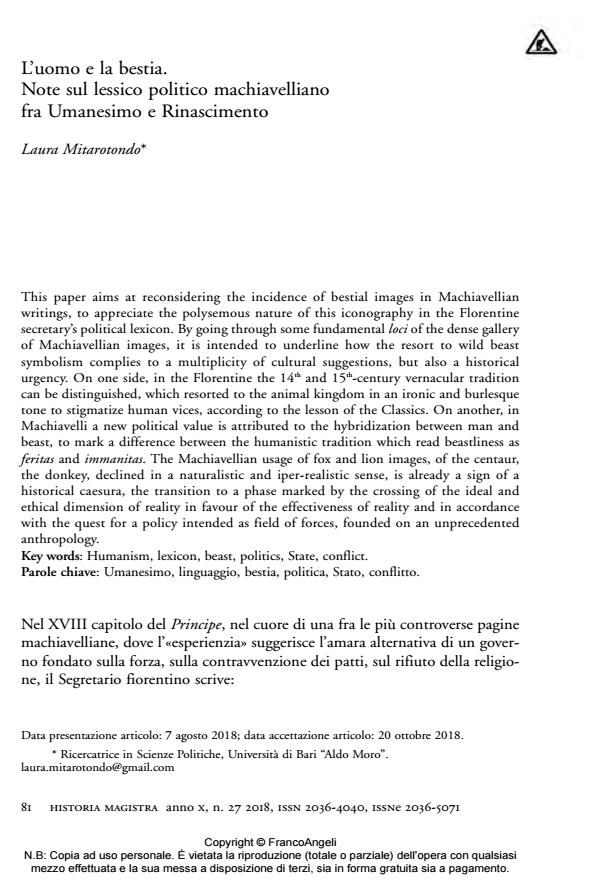L’uomo e la bestia. Note sul lessico politico machiavelliano fra Umanesimo e Rinascimento
Titolo Rivista HISTORIA MAGISTRA
Autori/Curatori Laura Mitarotondo
Anno di pubblicazione 2018 Fascicolo 2018/27
Lingua Italiano Numero pagine 18 P. 81-98 Dimensione file 122 KB
DOI 10.3280/HM2018-027006
Il DOI è il codice a barre della proprietà intellettuale: per saperne di più
clicca qui
Qui sotto puoi vedere in anteprima la prima pagina di questo articolo.
Se questo articolo ti interessa, lo puoi acquistare (e scaricare in formato pdf) seguendo le facili indicazioni per acquistare il download credit. Acquista Download Credits per scaricare questo Articolo in formato PDF

FrancoAngeli è membro della Publishers International Linking Association, Inc (PILA)associazione indipendente e non profit per facilitare (attraverso i servizi tecnologici implementati da CrossRef.org) l’accesso degli studiosi ai contenuti digitali nelle pubblicazioni professionali e scientifiche
This paper aims at reconsidering the incidence of bestial images in Machiavellian writings, to appreciate the polysemous nature of this iconography in the Florentine secretary’s political lexicon. By going through some fundamental loci of the dense gallery of Machiavellian images, it is intended to underline how the resort to wild beast symbolism complies to a multiplicity of cultural suggestions, but also a historical urgency. On one side, in the Florentine the 14th and 15th-century vernacular tradition can be distinguished, which resorted to the animal kingdom in an ironic and burlesque tone to stigmatize human vices, according to the lesson of the Classics. On another, in Machiavelli a new political value is attributed to the hybridization between man and beast, to mark a difference between the humanistic tradition which read beastliness as feritas and immanitas. The Machiavellian usage of fox and lion images, of the centaur, the donkey, declined in a naturalistic and iper-realistic sense, is already a sign of a historical caesura, the transition to a phase marked by the crossing of the ideal and ethical dimension of reality in favour of the effectiveness of reality and in accordance with the quest for a policy intended as field of forces, founded on an unprecedented anthropology.
Parole chiave:Humanism, lexicon, beast, politics, State, conflict.
Laura Mitarotondo, L’uomo e la bestia. Note sul lessico politico machiavelliano fra Umanesimo e Rinascimento in "HISTORIA MAGISTRA" 27/2018, pp 81-98, DOI: 10.3280/HM2018-027006